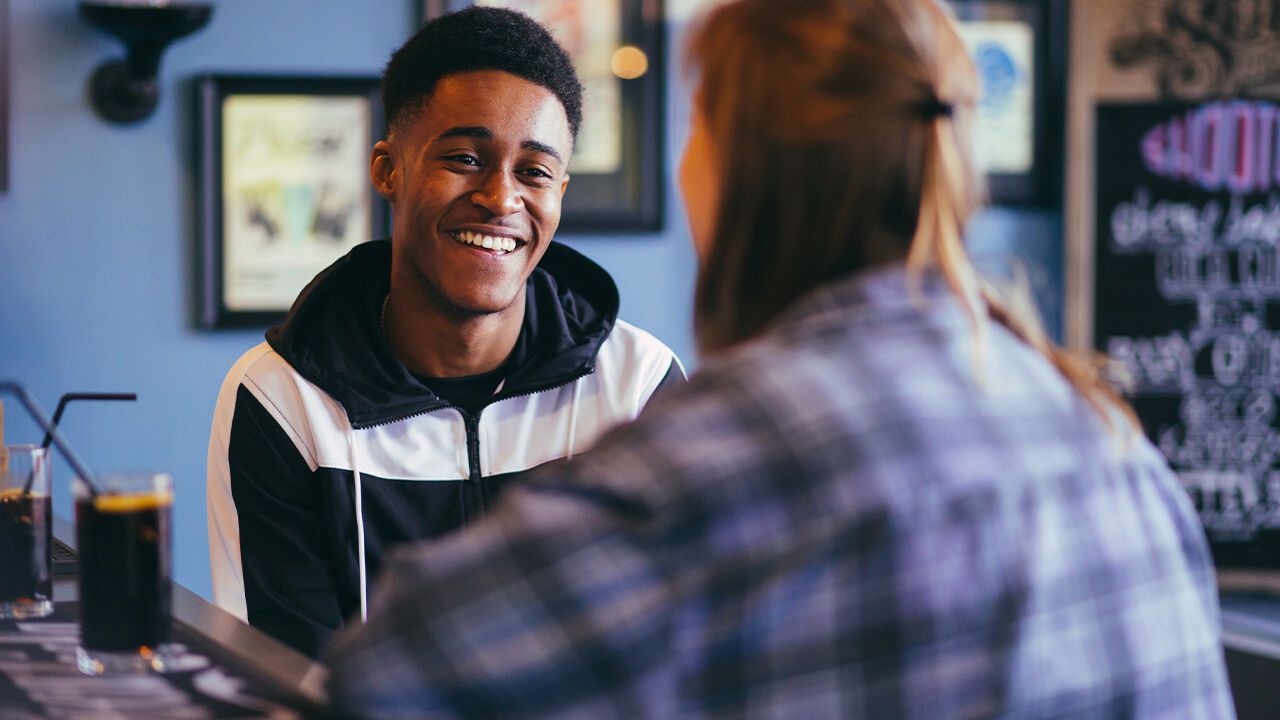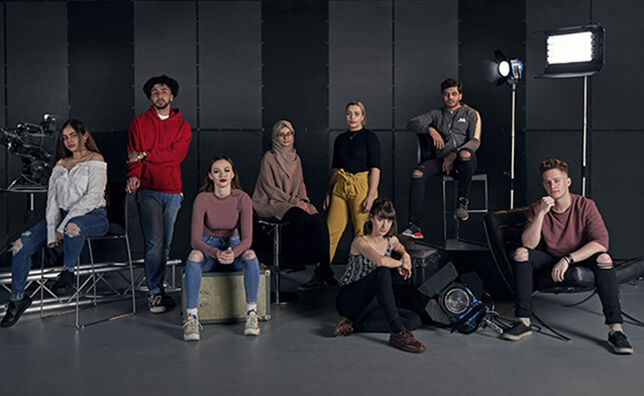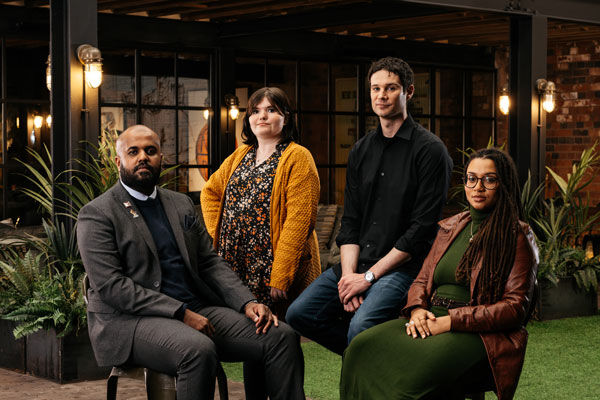Student support
Student Support
Hear from our Student Support team on everything from mental health, wellbeing, disability and support.
This session was recorded in April 2021
Watch video
Disability support
Our Disability Team answer some frequently asked questions on how you can make the most out of the support we offer our students here at BCU. Don't miss out on their useful information.
Mental Health and Wellbeing
The mental health and wellbeing team consists of counsellors, mental health advisers and wellbeing advisers. We offer free, confidential appointments 51 weeks of the year.
More on mental health and wellbeing
Laura's story
"Since starting at BCU, I have learnt that anything is possible, and I have gone from strength to strength. Being a student here means inclusion for everyone, that I can achieve anything and most importantly that I have a voice regardless of my disability."
Read Laura's storyStudent Support
Looking for more information on financial help is on offer, or what other support is available at BCU? Take a look at our Student Support pages.
More on Student Support
Contact us
If you have any questions about the student support available at BCU that we haven't answered for you, get in touch and we'll be happy to help.
Ask a question
I AM BCU
Read through our students' I AM BCU stories to discover what it's like to study with us, and what support and encouragement we give you when you decide to join us.
Discover I AM BCU
More information
-
Accommodation
-
Tours
-
Student support
-
Fees & Funding
Accommodation
Find your home from home at BCU. We offer eight halls of residence options, ranging from on-campus to inner-city living. You can take a virtual tour of each accommodation option to find the one for you.
More about accommodationTours
We’ve invested over £400 million in our facilities and are proud to show you around.
View campus toursStudent support
From disability and mental health support to CV and job interview training, BCU ensures you have all you need during your time here – and beyond – to succeed and flourish in your studies and career.
More about student supportFees & Funding
Fees, funding, budgeting, money management – we can help you get to grips with it all, including a guide to postgraduate student loans.
More about fees and fundingAccessibility
All of the videos on this page have been audibly transcribed.
-
Disability support
Kate [00:00:03] Hi, everyone, welcome to our disability Q&A session. I'm Kate Waugh I'm from Birmingham City University I'm the Head of Disability Services. Today, we're going to answer a variety of questions about disability support here at BCU. And I'm joined by key panel members so I'm going to go around the room for some introductions first of all.
Sherv [00:00:27] Hello, everyone, and thanks for joining us today. My name's Shervjeet Garcha. And you can call me Sherv, everyone does. I'm the Disability Support Manager at BCU. So hopefully we will meet.
Kate [00:00:41] Thank you, Caroline.
Caroline [00:00:43] Thanks, Kate. Hello, everybody. Nice to nice to meet you. My name is Caroline and I'm in the Disability Support Team and I get involved with anything to do with dyslexia. So hopefully we'll have the opportunity to chat about that.
Kate [00:00:58] Thank you, Caroline. So we're going to start the Q&A session now. And so to start off, I just want to say we support a lot of disabled students every academic year.
Kate [00:01:10] And so I don't want you to feel that you are going to be alone having support at university a lot of students are getting support from us. I think we also want to say that the definition of disability is very wide. So if you have a condition and you're not you're not sure whether you're entitled to support or not, please just tell us about it. We'll be happy to talk to you whether you're entitled to support and what that support might look like.
Kate [00:01:35] OK, so I'm going to start off by asking Sherv the question. So can you tell us what disability support for students consists of at BCU?
Sherv [00:01:47] Yes. So when you arrive at BCU or even before you arrive, we do request some medical evidence that shows us what disability or long term health condition you have and potentially what the impact of that is based on that information.
Sherv [00:02:07] We then produce a support summary. The support summary outlines what reasonable adjustments the university will make in order to support your learning. The support summary will be varied and it will be shared with you initially and then shared with academic colleagues. The support summary will give reasonable adjustments, such as additional time for assignments based on word count, additional time for your exams. There may be things like sensitive marking so that lecturers are marking for content only and not paying as much attention to spelling and grammar. There might be things like, for example, use of an office chair to make you more comfortable while you're in the lectures. It's it's varied. It could be coloured paper or coloured overlays.
Sherv [00:03:00] The support summary will will be individualised and based on your specific needs, so things like rest breaks could be incorporated into it too. So we will produce a support summary which will outline all of the reasonable adjustments that we will make at university to support your learning. As well as that, we we do encourage you all to apply for disabled students allowances and disabled students allowances, ideally you would apply for those as applicants before you start in the summer, before you start with us in September or January, for example. And disabled students allowances are fantastic because you can access things like a laptop with pre-programmed assistive technology on that. You can get training to use that assistive technology most effectively to support your learning. You can also get one to one support through disabled students allowances. And that can be things like BSL interpreters for students who are deaf. It can also include mentors for students, mental health mentors, autism mentors and also study skills tutors, the one to one support is also key because the aim when you come to university is for us to support your independent learning.
Sherv [00:04:27] And things like assistive technology is really useful in helping you develop strategies to be able to learn independently. And you can also use that assistive technology to graduate and you go into the world of work.
Sherv [00:04:43] So the support is twofold. Our in-house support that we will give you through producing an individualised support summary with all of the reasonable adjustments that you require and the disabled students allowances.
Kate [00:05:05] Thank you very much Sherv. Caroline, I'm going to turn to you now, Caroline is our dyslexia advisor, so I'm going to ask Caroline, what a potential applicant to BCU should do if they think they might have a specific learning difficulty, such as dyslexia or ADHD?
Caroline [00:05:20] OK, thank you, Kate. There are three key things I'd like to say about this one.
Caroline [00:05:28] If you've already had a diagnostic assessment, so you've worked with possibly an educational psychologist or you had an appointment with the teacher assessor, they diagnosed you and written quite a lengthy report, usually about twenty to twenty five pages. And in it says, yes, you have dyslexia and perhaps it also says you have dypraxia as well, or you may have some medical evidence. You may have had a medical diagnosis for ADHD. If you have any kind of evidence like that, please, as a starting point, do send it to us, then we can look to see the recommendations are from that assessor for your needs. And as Sherv was saying, we'll then put that information into our disability support summary. We also add a few extras and that will give you your reasonable adjustments at the university for your course. The second point is you may have had an assessment done possibly at school before you took GCSE or possibly AS/A levels, or you may have been advised by school to wait until you got to college. And you may have done a fairly short in-house assessment at college, which usually aims to see whether you would need additional time for any coursework exams you may have to take now after that assessment. Sometimes people get given a short report. Sometimes they also get given a form that's being completed called a Form eight that's usually written in the top right hand corner of the report. This report doesn't tend to suggest you have dyslexia, it doesn't diagnose dyslexia, but it will set out why you need the additional time. So any documentation like that, again, please send it to us. We can look to see if based on the information in that report, we would then need to start the screening process to look into getting you a diagnosis. So anything you can send us report wise is going to be very helpful from the point of view of informing us of your needs. The third point is you may not have any documentation at all.
Caroline [00:08:00] You may have thought quietly for years you could have a specific learning difficulty, such as dyslexia or dypraxia or ADHD. But there's never been the opportunity to get an assessment done at school or college. You may have been advised to leave it until you come to uni. You may have done an assessment for extra time at college, but nobody gave you a report. So if you're in that situation, do contact us and let us know that you don't have the evidence you would like that you feel there may be a specific learning difficulty there because we'd be able to advise you about how to look into getting a diagnosis before you come to uni. Obviously, it's better for you to look into it in advance because that way you'll have your diagnosis in place. And then the report from that diagnosis you can use as your medical evidence to apply for the disabled students allowances. So fundamentally, if you have a diagnostic report, if you have an access arrangement to report or formate or you've got a private thought, which means you've been thinking along dyslexic lines for most of your life, please contact us to let us know and we can advise you accordingly.
Kate [00:09:30] Lovely, thank you, Caroline. So we've heard about one to one support that's available via the disabled students allowance package. Can you tell us about that support and why so helpful?
Caroline [00:09:43] The one to one support is delivered by a specialist study school study skills excuse me, tutor, the reason they're specialists is because they would have done advanced qualifications in how to work with individuals who have specific learning difficulties. So although in their previous years they may have done their own degrees in subjects they're interested in in terms of working with yourselves, they are qualified, specific learning difficulties, tutors, which means they are trained to work with individuals with a range of needs. And it's very common, as you're probably aware, for individuals to have more than one specific need. So if you have dyslexia, dyspraxia, your tutor would be well trained to support you, as well as working with someone who may have dyslexia and ADHD. So we're very lucky to know that the team of tutors who work at the uni and have worked with us for many years are extremely qualified in the full range of specific needs just to PS to that point. This means that your tutor isn't necessarily qualified in your subject area. So it's not necessarily going to be the case that if you're doing a law degree, for example, you'd have a dyslexia specialist tutor who's also qualified in law. The point of working with that individual is their dyslexia specialism, not the subject specialism. So how does it work? The aim of this support is to really work with you to develop strategies, picking up on what Sherv was saying, strategies to help you with your learning. For example, a classic example that many people tell us about is they struggle to get started on doing an assignment. It's that getting that initial sentence or the opening paragraph down. And we've all been there and we've all had to work out our own ways of somehow dragging that that initial sentence and getting into it. But it may be it takes two or three weeks to get it done. So you would talk to your specialist support tutor and say, I do have a way round this, but it takes too long and it doesn't leave me comfortable in the process. How can I start to write my assignments more quickly without having to go through this process? And your tutor would then work with you to understand how you like to learn best. And then it's part of their role to help you develop those ways. So you may try using one of the methods with one of your assignments and then afterwards evaluate it. Did it work for you? Did it not work for you? Which bits of it will you tweak to make sure it's better later? And what I find is after I've met a student, say, in their first year and then I meet them perhaps, hopefully again in their second year and say, how are you getting on? What they tend to say to me? I'm doing much better, Caroline, because I've got my systems in place now. I know how to get on and do my stuff. So what that means to my ears, is they've helped, their tutor's helped them develop the strategy. It's worked and that's empowered the student to feel that they're more in control of what they're doing and they know how to get into their work, which is fundamentally making us so much more independent as learners. So it's very much a team effort between you and your support tutor to keep you in the driving seat and feel that you're developing your skills in terms of the learning and you're making progress and you feel in control of what you're doing in terms of how it pans out. You usually get allocated a certain number of hours per academic year, tends to be about 30 hours per year.
Caroline [00:13:57] Nursing students tend to get more about forty six because your academic year is a little longer. And usually people work with their tutors for one or two hours a week. They get into a wonderful routine of regularly seeing their tutors once a week. There may be there may be weeks when you need to book more appointments. There may be weeks when you do slightly fewer. But ultimately, what students have told us is that the more regularly they work with the tutor, the better it is for them because they've got regular input, regular skill development. And ultimately they do feel it impacts on their marks. A lot of students will say their marks generally improve after working with their support tutor, because they're covering all bases, they're looking at planning, they're looking at structuring, they're looking at developing their argument, they're talking about what they feel it means to their tutor. They're learning editing skills.
Caroline [00:15:02] So it's not a case of your tutor doing proofreading for you. That's very much seeing this old style and way out the window now, at universities, it's more about developing your skills as an editor so you know yourself from your work, what you need to change. So ultimately, an incredibly powerful relationship, and the more you work with your tutor regularly, ultimately, I think the better it is.
Kate [00:15:34] Thank you Caroline and just to add to that, a few other types of one to one support which are also incredibly powerful are mentors for mental health difficulties and mentors for for aspergers and autism in a similar way they work on a one to one basis with you and to look at how your studies are impacting your disability and vice versa and develop strategies to manage your learning disability as you go along through your course, get more independence and get much better at managing yourself so we would encourage you if you get any support to use them to the max, because we know how valuable they are for students and how much they get out of them and what impact they have on their final degree Kate [00:16:22] So another question for Sherv now, we've heard a lot about disabled students allowances can you tell us about the process?
Sherv [00:16:34] So, yeah, thanks Kate. As with our support, our in-house support, when we produce the support summary outlining your reasonable adjustments, we ask for medical evidence. So the first stage for the Disabled Students Allowance is application is getting your medical evidence out and ready to submit with your application form so an application form can be filled in online as soon as you've. We usually notify students when applications are available online to be completed. It's quite a simple application to complete. You just put down your basic details, your personal details, what your medical condition is and the impact. You then attach your medical evidence to that. So that could be any type of medical information from a medical professional, could be from a consultant, a specialist nurse, a GP, a physiotherapist. As long as they are a medical professional, they will be accepted. If you're unsure about what medical and whether your medical evidence is sufficient, you can ask us to take a look at it. We will also be able to help you complete your application form for Disabled Students Allowances if you're struggling. But it is quite simple. You upload the electronic application to it's when you apply for your tuition loan. If if you tick a box on the application to say that you do have a disability, that will then get you into the disabled students allowance applications very simple to complete, complete the online application, submit your medical evidence with it.
Sherv [00:18:24] If it's dyslexia, for example, you'll need to submit your dyslexia diagnostic report. The full report, not just access arrangements, as Caroline has said, because access arrangements don't give a full diagnosis of dyslexia.
Sherv [00:18:39] Once you've submitted that the DSA team will review the application, check your eligible, and once you're at that determined that you're eligible, they'll send you a DSA-1 form that on the email that they send to you, they will invite you to attend an assessment centre. Now, the assessment centres at the moment obviously are being done online, but they can be done face to face in normal circumstances. You'll there are assessment centres across the whole of the country. So you are definitely going to be able to find a centre that's very close for you to get to. You go along to the assessment centre, you meet your assessor, your assessor of needs is not there to judge you or or to ask you any difficult questions. It's not test. What they will be doing is they'll be talking to you about the impact of your disability and health condition on your studies and on your learning that will also demonstrate lots of assistive technology. And I've mentioned assistive technology before, but the assistive technologies is fantastic. There are so many tools out there that can help you now, things like Dragon Dictate, for example, where you can speak into software and will type and write your assignments for you, read and write gold. There's various assistive technology. They'll demonstrate assistive technology, they'll talk to you about your needs and they'll then produce a report based on the assessment of needs usually is a couple of hours long, no more than that. They will then establish what is going to support you.
Sherv [00:20:24] Usually they'll recommend things like laptops with assistive technology, they can also recommend things like laptop carry cases. If you got a physical or mobility issue, they can even recommend ergonomic seating and chairs.
Sherv [00:20:41] They'll they'll make that recommendation in a report together with technology in the laptop. They'll recommend any anything, any one to one support that you need.
Sherv [00:20:52] So that could be a BSL interpreter, an autism mentor, a mental health mentor or a study skills tutor, if you have dyslexia, they'll make all those recommendations and send that report to the DSA team. The DSA team will review the report and send you DSA-2 letter. In that letter, they'll outline what you need to do next. Usually, and this is crucial, you'll need to telephone or email suppliers. So suppliers for the laptop to be delivered to your home address and for the assistive technology training. Now, assistive technology is fantastic, but you need to be trained in how to use it effectively. So part of the assessment will be usually about three or four days worth of training from a specialist assistive technology trainer.
Sherv [00:21:43] Please get in touch with that trainer to organise training in your own home. That's how it usually happens in the pre-covid world now that it's probably be done online at the moment. So it's important that you request the training and you request the software and the laptop is delivered to your home address with the with the one to one support, hopefully they've recommended BCU as your supplier. So when before you enrol, will get in touch with you. As soon as we've got the form back to us to say that you're eligible for one to one support, we'll email you straightaway and say as soon as you have your timetable please let us know your availability so that we can allocate a tutor or mentor to support you. And then the relationship will start between you and your tutor and mentor. And hopefully together you'll achieve better, better results on all of your assignments and you'll develop a really good rapport with that tutor and mentor. So I think that just about sums it up, please follow all of the steps when the, when the DSA team email you, respond to what they've said, check your spam folder as well. Sometimes their emails do end up in the junk. And I do appreciate that you do get a lot of emails, but these emails are important for you to read so that you can access the support that you're entitled to receive.
Kate [00:23:21] Thank you Sherv, OK we've touched on mental health mentoring, Sherv can you just outline what support do people with mental health difficulties get at BCU?
Sherv [00:23:31] Yeah, so one of the teams that works alongside is our sister team, if you like, is the Mental Health and Wellbeing team. Now, that team has got well-being advisors in there, CBT therapists and trained counsellors. The support they give is quite similar to us in terms of they will produce a support summary and outline the reasonable adjustments that you will need to help you achieve while you're studying. But on top of that, you can also register for their service and access a regular appointment with a wellbeing advisor or a counsellor. So you may be able to, for example, see one of their counsellors every couple of weeks for a catch up and a session with them. So if if your predominant need is mental health and you have got some medical evidence because, again, the mental health team do request medical evidence to when they like medical evidence to be current within within the year, not very old evidence because as we know, mental health conditions do tend to fluctuate. They'll ask for the medical evidence, but you can register to get support from the mental health team. So if you've had counselling prior to coming to university, you'll be able to continue with that to some extent at university with one of our trained counsellors.
Kate [00:25:02] Thank you very much Sherv. So, we've come to our final question. Sherv, What should a potential applicant to BCU, who has been watching this do next? If they think that they'll need disability support at university, what are the next couple of things they need to do?
Sherv [00:25:19] OK, well, if you've declared on your application form that you've got a disability or long term health condition. One of our advisers, Daryn, who advises applicants will email you out immediately and he'll email you with three important steps that you need to complete. The first one is get your medical evidence ready to send back to us. Secondly, apply for your disabled students allowances and apply as early as possible. So complete the online application form and send the medical evidence to them as well. And also, he'll ask you to complete what's called a profile form for us, and that just gives us some overt some some details about your disability or health condition and and what support you've had in the past. So we can start preparing to welcome you to BCU because over the summer, at the end of the day, at the end of the academic year, we do start working very heavily with all of our applicants, applicants and all of the applicants that have sent in information we'll start producing their support summaries early in the summer. So the quicker you are to respond and get those steps done, importantly, dig out your medical evidence, get your disabled students allowance application in. The quicker you are to do that, the quicker we can get your support in place. So it's ready practically day one when you start at university. [00:26:55] That's lovely, thank you Sherv. So that brings our disability Q&A session to a close. We hope you found it useful. Thank you very much for joining us. -
Laura's story
Laura Fogarty: [00:00:04] I am Laura and I am studying Psychology with Criminology, and I'm in my second year. [00:00:08][4.0] Laura Fogarty: [00:00:11] I didn't always want to come to university. I had a job before I applied to come to university. And unfortunately, I became unwell, which prompted me to come along and apply. And it really gave me a positive outlook being unwell in that I wanted to return to education. I became pregnant with my son, who is now four. And I became extremely unwell after I had him, which resulted in me having to go onto an inpatient unit for five months, that was probably one of the main challenges for me, is living with a mental illness and being a student. BCU is amazing for mental health because my personal tutor is always available if I need to have a chat. If I become stressed about certain aspects of my work, I can just go to her. And I have also made friends that have helped me massively along the way, that have been so understanding of my mental health. So if they notice that I'm not feeling too well or acting a little bit different. Just having a chat with them makes a massive difference. At the start I did struggle to fit in, one because I thought that I wouldn't fit in because of my age. However, when I got here, I realised even the people younger than me was really accepting and they didn't see me for my age, they just see me as a person and as a student. And everybody's like one big family. And even if I don't have my friends, I have the lecturers who I can go to and there's just always really somebody to go to to talk to. So when I first arrived at BCU, the main goal was to get a degree. However, now it is to get the job that I am most happiest in, and that is in mental health. That is where I really want to work. I am most proud of myself and what I've achieved. I'm proud that I came from being an inpatient on a mental health ward to being able to be a student and a successful student. I am BCU for me and is a strong support system within all aspects, within mental health, within having a diverse range of students and lecturers. It's really welcoming. It's about people from all walks of life. [00:00:11][0.0] [4.0]
Recent searches
No recent searches
Popular searches
Suggested searches